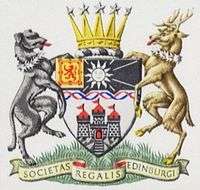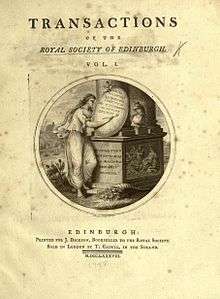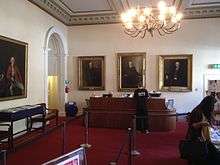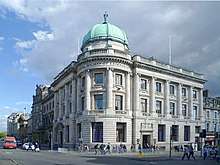Royal Society of Edinburgh
The Royal Society of Edinburgh is Scotland's national academy of science and letters. It is a registered charity, operating on a wholly independent and non-party-political basis and providing public benefit throughout Scotland. It was established in 1783. As of 2017, it has more than 1,660 Fellows.[1]
 Arms of the Royal Society of Edinburgh | |
| Motto | Societas Regalis Edinburgi |
|---|---|
| Established | 1737 – diverged from the Royal Medical Society 1783 – received royal charter |
| Founder | Colin Maclaurin and Alexander Monro, primus (instrumental in founding the Philosophical Society of Edinburgh) William Cullen, Alexander Monro, secundus and William Robertson (instrumental in obtaining the royal charter) |
| Focus | Science and technology Arts Humanities Social science Business Public service |
| Headquarters | 22–26 George Street, Edinburgh, EH2 2PQ |
| Location | |
Members | Over 1600 Fellows |
| Owner | Registered charity No. SC000470 |
President | Professor Dame Anne Glover |
Chief Executive | Dr Rebekah Widdowfield |
Key people | Dr. Alison Elliot, General Secretary |
| Subsidiaries | RSE Scotland Foundation RSE Young Academy of Scotland |
Budget | £5.9 million |
Staff | 34 |
| Website | www |
Formerly called | Philosophical Society of Edinburgh |

The Society covers a broader selection of fields than the Royal Society of London including literature and history.[2][3] Fellowship includes people from a wide range of disciplines – science & technology, arts, humanities, medicine, social science, business, and public service.
History

At the start of the 18th century, Edinburgh's intellectual climate fostered many clubs and societies (see Scottish Enlightenment). Though there were several that treated the arts, sciences and medicine, the most prestigious was the Society for the Improvement of Medical Knowledge, commonly referred to as the Medical Society of Edinburgh, co-founded by the mathematician Colin Maclaurin in 1731.
Maclaurin was unhappy with the specialist nature of the Medical Society,[4] and in 1737 a new, broader society, the Edinburgh Society for Improving Arts and Sciences and particularly Natural Knowledge was split from the specialist medical organisation, which then went on to become the Royal Medical Society.
The cumbersome name was changed the following year to the Edinburgh Philosophical Society. With the help of University of Edinburgh professors like Joseph Black, William Cullen and John Walker, this society transformed itself into the Royal Society of Edinburgh in 1783 and in 1788 it issued the first volume of its new journal Transactions of the Royal Society of Edinburgh.[5]
As the end of the century drew near, the younger members such as Sir James Hall embraced Lavoisier's new nomenclature and the members split over the practical and theoretical objectives of the society. This resulted in the founding of the Wernerian Society (1808–58), a parallel organisation that focused more upon natural history and scientific research that could be used to improve Scotland's weak agricultural and industrial base. Under the leadership of Prof. Robert Jameson, the Wernerians first founded Memoirs of the Wernerian Natural History Society (1808–21) and then the Edinburgh Philosophical Journal (1822), thereby diverting the output of the Royal Society's Transactions. Thus, for the first four decades of the 19th century, the RSE's members published brilliant articles in two different journals. By the 1850s, the society once again unified its membership under one journal.
During the 19th century the society contained many scientists whose ideas laid the foundation of the modern sciences. From the 20th century onward, the society functioned not only as a focal point for Scotland's eminent scientists, but also the arts and humanities. It still exists today and continues to promote original research in Scotland.
In February 2014, Dame Jocelyn Bell Burnell was announced as the society's first female president, taking up her position in October.[6]
Location

The Royal Society has been housed in a succession of locations:[7]
- 1783–1807 – College Library, University of Edinburgh
- 1807–1810 – Physicians' Hall, George Street; the home of the Royal College of Physicians of Edinburgh
- 1810–1826 – 40–42 George Street; shared with the Society of Antiquaries of Scotland from 1813
- 1826–1908 – the Royal Institution (now called the Royal Scottish Academy Building) on the Mound; shared, at first, with the Board of Manufactures (the owners), the Institution for the Encouragement of the Fine Arts in Scotland and the Society of Antiquaries of Scotland
- 1908–09 – University premises at High School Yards
- 1909–present – 22–24 George Street, purchased from the Edinburgh Life Assurance Company with the assistance of a grant of £25,000 from the Scottish Office
Awards and medals
Fellowship
Fellowship of the Royal Society of Edinburgh is an award in its own right[8] that entitles fellows to use of the initialism or post-nominal letters FRSE in official titles.
Royal Medals
The Royal Medals are awarded annually, preferably to people with a Scottish connection, who have achieved distinction and international repute in either Life Sciences, Physical and Engineering Sciences, Arts, Humanities and Social Sciences or Business and Commerce. The Medals were instituted in 2000 by Queen Elizabeth II, whose permission is required to make a presentation.[9]
Past winners[9] include:
- 2018: David Climie, Professor Richard Henderson and Thea Musgrave
- 2017: Professor Tessa Holyoake[10]
- 2016: Professor James Hough and Professor Sir Angus Stewart Deaton
- 2015: No award
- 2014: Professor W.B. Kibble and Professor Richard G.M. Morris[11]
- 2013: Sir John Cadogan, Professor Michael Ferguson and Sir Ian Wood[12]
- 2012: Professor David Milne and Sir Edwin Southern[13]
- 2011: Baroness Helena Kennedy, Noreen Murray and Professor Desmond Smith[14]
- 2010: Professor Sir Fraser Stoddart and Dr James MacMillan
- 2009: Sir James Mirrlees, Professor Wilson Sibbett and Professor Karen Vousden
- 2008: Professor Roger Fletcher, Right Reverend Richard Holloway and Professor Sir David Lane
- 2007: Professor Sir David Carter, Professor John David M H Laver and Sir Thomas F W McKillop
- 2006: Sir John M. Ball and Sir David Jack
- 2005: Sir David Edward and Professor William G. Hill
- 2004: Sir Philip Cohen, Sir Neil MacCormick and Professor Robin Milner
- 2003: Sir Paul Nurse, Lord Mackay of Clashfern and Sir Michael Atiyah
- 2002: Professor Sir Alfred Cuschieri, Professor Sir Alan Peacock and Professor John R Mallard
- 2001: Professor Sir James Black, Professor Tom Devine and Professor A Ian Scott
- 2000: Professor Sir Kenneth Murray, Professor Peter Higgs and The Rt. Hon The Lord Perry of Walton
Lord Kelvin Medal
The Lord Kelvin Medal is the Senior Prize for Physical, Engineering and Informatics Sciences. It is awarded annually to a person who has achieved distinction nationally and internationally, and who has contributed to wider society by the accessible dissemination of research and scholarship. Winners receive a silver medal and are required to deliver a public lecture in Scotland. The award is named after William Thomson, 1st Baron Kelvin (1824–1907), who was a famous mathematical physicist and engineer, and Professor of Natural Philosophy at the University of Glasgow. Senior Prize-winners are required to have a Scottish connection but can be based anywhere in the world.
Keith Medal
The Keith medal has been historically awarded every four years for a scientific paper published in the society's scientific journals, preference being given to a paper containing a discovery. It is awarded alternately for papers on Mathematics or Earth and Environmental Sciences. The medal was founded in 1827 as a result of a bequest by Alexander Keith of Dunnottar, the first Treasurer of the Society.[15]
Makdougall Brisbane Prize
The Makdougall Brisbane Prize has been awarded biennially, preferably to people working in Scotland, with no more than fifteen years post-doctoral experience, for particular distinction in the promotion of scientific research and is awarded sequentially to research workers in the Physical Sciences, Engineering Sciences and Biological Sciences. The prize was founded in 1855 by Sir Thomas Makdougall Brisbane, the long-serving fourth President of the Society.[16]
Gunning Victoria Jubilee Prize
The 'Gunning Victoria Jubilee Prize Lectureship' is a quadrennial award to recognise original work done by scientists resident in or connected with Scotland. The award was founded in 1887 by Dr Robert Halliday Gunning, a Scottish surgeon, entrepreneur and philanthropist who spent much of his life in Brazil.
Bruce-Preller Lectures
See separate article on Dr Charles S. du Riche Preller for the list of lecturers.
This biennial lecture given at the Society was begun in 1931 at the bequest of Dr Charles Preller and named after himself and his late wife, Rachel Steuart Bruce.
It is usually (but not invariably) given by a Fellow either of the Royal Society of Edinburgh or the Royal Society of London.
Presidents
Presidents of the Royal Society of Edinburgh have included:
- The Duke of Buccleuch (1783–1812)
- Sir James Hall (1812–1820)
- Sir Walter Scott (1820–1832)
- Sir Thomas Makdougall Brisbane (1832–1860)
- The Duke of Argyll (1860–1864)
- Principal Sir David Brewster (1864–1868)
- Sir Robert Christison (1869–1873)
- Sir William Thomson (later Lord Kelvin) (1873–1878)
- Rev Philip Kelland (1878–1879)
- Lord Moncreiff of Tullibole (1879–1884)
- Thomas Stevenson (1884–1885)
- Sir William Thomson (later Lord Kelvin) (1886–1890)
- Sir Douglas Maclagan (1890–1895)
- Lord Kelvin (1895–1907)
- Principal Sir William Turner (1908–1913)
- Professor James Geikie (1913–1915)
- Dr John Horne (1915–1919)
- Professor Frederick Orpen Bower (1919–1924)
- Sir Alfred Ewing (1924–1929)
- Sir Edward Sharpey Schafer (1929–1934)
- Sir D'Arcy Wentworth Thompson (1934–1939)
- Professor Sir Edmund Whittaker (1939–1944)
- Professor Sir William Wright Smith (1944–1949)
- Professor James Kendall (1949–1954)
- Professor James Ritchie (1954–1958)
- Professor J. Norman Davidson (1958–1959)
- Professor Sir Edmund Hirst (1959–1964)
- Professor J. Norman Davidson (1964–1967)
- Professor Norman Feather (1967–1970)
- Sir Maurice Yonge (1970–1973)
- Lord Cameron (1973–1976)
- Professor Robert Allan Smith (1976–1979)
- Sir Kenneth Blaxter (1979–1982)
- Sir John Atwell (1982–1985)
- Sir Alwyn Williams (1985–1988)
- Professor Charles Kemball (1988–1991)
- Professor Sir Alastair Currie (1991–1993)
- Dr Thomas L. Johnston (1993–1996)
- Professor Malcolm Jeeves (1996–1999)
- Sir William Stewart (1999–2002)
- Lord Sutherland of Houndwood (2002–2005)
- Sir Michael Atiyah (2005–2008)
- Lord Wilson of Tillyorn (2008–2011)
- Sir John Peebles Arbuthnott (2011–October 2014)
- Professor Dame Jocelyn Bell Burnell (October 2014–April 2018)[17]
- Professor Dame Anne Glover (April 2018–present)[18][19]
Vice Presidents
The Society traditionally has more than one Vice President at any given time. Vice Presidents of the Royal Society of Edinburgh have included:
- Henry Dundas (1789–1796)
- William Nairne, Lord Dunsinane (1789–1796)
- John Webb Seymour (1802-1805)
- Allan Maconochie, Lord Meadowbank (1812–1816)
- Francis Gray, 14th Lord Gray (1815–1823)
- Samuel Shepherd (1823-1830)
- Thomas Charles Hope (1823–1833)
- Henry Mackenzie (1828–1831)
- Alexander Irving, Lord Newton (1828–1832)
- Sir Thomas Makdougall Brisbane (1831–1832)
- Sir David Brewster (1831–1864)
- Charles Cathcart, 2nd Earl Cathcart (1834–1840, 1841–1845)
- Rev. Thomas Chalmers (1835–1842)
- Dr John Abercrombie (1835–1844)
- Very Rev. Prof John Lee (1842–1859)
- Sir George Steuart Mackenzie (1844–1848)
- Ref Charles Terrot (1844-1860)
- Sir Robert Christison (1845–1865, 1866–1868)
- William Pulteney Alison (1848–1859)
- John Murray, Lord Murray (1849–1857)
- Philip Kelland (1857–1866, 1867–1872, 1873–1877)
- Edward Bannerman Ramsay (Dean Ramsay) (1859–1862)
- Charles Neaves, Lord Neaves (1859–1867, 1868–1873, 1874–1876)
- James David Forbes (1860–1868)
- Cosmo Innes (1862–1869)
- Lyon Playfair, 1st Baron Playfair (1864–1870)
- David Milne Home (1865–1871, 1872–1882, 1884–1888)
- William Forbes Skene (1869-1871)
- Sir Alexander Grant, 10th Baronet of Dalvey (1870–1874, 1876–1881)
- William John Macquorn Rankine (1871–1872)
- William Stirling-Maxwell (1871–1875)
- Rev. William Lindsay Alexander (1873–1878, 1880–1884)
- Henry Cotterill (1875–1880)
- Charles Wyville Thomson (1877-1882)
- Sir Andrew Douglas Maclagan (1878–1883, 1885–1890)
- Fleeming Jenkin (1879–1884)
- John Hutton Balfour (1881–1883)
- Thomas Stevenson (1882-1884)
- Robert Gray (1882–1886)
- Edward Sang (1883-1885)
- Alexander Forbes Irvine (1883–1887, 1890–1892)
- John McLaren, Lord McLaren (1885–1891, 1892–1898, 1901–1906)
- Robert Flint (1886–1892, 1893–1899, 1902–1907)
- George Chrystal (1887–1893, 1895–1901)
- Sir Thomas Muir (1888–1891)
- Sir William Turner (1891-1895, 1897-1903)
- Ralph Copeland (1892–1896, 1898–1903)
- James Geikie (1892–1897, 1900–1905)
- John Gray McKendrick (1894–1900)
- Rev. John Duns (1899–1904)
- Robert Munro (archaeologist) (1903–1908)
- Alexander Crum Brown (1905–1911)
- Alexander Buchan (1906–1907)
- Andrew Gray (1906–1909)
- James Cossar Ewart (1907–1912)
- John Horne (1907–1913)
- James Burgess (1908–1914)
- Sir Thomas Hudson Beare (1909–1915, 1923–1926)
- Frederick Orpen Bower (1910–1916)
- Sir Thomas Richard Fraser (1911–1916)
- Ben Peach (1912–1917)
- Edward Albert Sharpey-Schafer (1913-1917)
- John Macdonald, Lord Kingsburgh (1914–1918)
- Ralph Allan Sampson (1915-1918)
- D'Arcy Wentworth Thompson (1916-1919)
- Prof James Walker (1916-1919)
- Robert Kidston (1917–1920)
- George Alexander Gibson (1917–1920)
- Diarmid Noel Paton (1918–1921)
- Arthur Robinson (1918–1921)
- Sir George Andreas Berry (1919–1922)
- William Peddie (1919–1922)
- Sir James Alfred Ewing (1920–1923)
- John Walter Gregory (1920–1923)
- William Burney Bannerman (1921–1924)
- William Archer Porter Tait (1921-1924)
- Sir James Colquhoun Irvine (1922–1925)
- James Hartley Ashworth (1923–1926, 1930–1933)
- Walter Biggar Blaikie (1924–1927)
- Sir Robert Blyth Greig (1924–1927)
- Thomas Hastie Bryce (1925–1928)
- Edmund Taylor Whittaker (1925-1928, 1937-1939)
- James Currie (1926–1929)
- Arthur Crichton Mitchell (1926–1929)
- William Carmichael McIntosh (1927–1930)
- Sir Robert William Philip (1927–1930)
- Sir John Graham Kerr (1928–1931)
- William Wright Smith (1928-1931)
- Francis Gibson Baily (1929–1932)
- Thomas James Jehu (1929–1932)
- Arthur Logan Turner (1930–1933)
- John Brown Clark (1931–1934)
- Christopher Nicholson Johnston, Lord Sands (1932–1934)
- Sir Thomas Henry Holland (1932–1935)
- Sir Charles Galton Darwin (1933–1936)
- Victor Hope, 2nd Marquess of Linlithgow (1934–1937)
- Orlando Charnock Bradley (1934–1937)
- Percy Theodore Herring (1934–1937)
- Sir Edward Battersby Bailey (1935–1937)
- Francis Albert Eley Crew (1936–1939)
- Anderson Gray McKendrick (1936–1939)
- John Walton (1937-1940)
- James Watt (1937-1940, 1941-1944)
- John Alexander Inglis (1939–1942)
- Leonard Dobbin (1939–1942)
- George Walter Tyrrell (1940-1943)
- C. T. R. Wilson (1940-1943)
- John Boyd Orr, 1st Baron Boyd-Orr (1942–1945)
- Alan William Greenwood (1943–1946)
- Edward Hindle (1943–1946)
- Sir David Russell (1943-1946)
- Robert James Douglas Graham (1944–1947)
- Thomas Mackay Cooper (1945–1948)
- John William Heslop Harrison (1945–1948)
- William Frederick Harvey (1946–1948)
- James Pickering Kendall (1946–1949)
- William Michael Herbert Greaves (1946–1949)
- Ernest Wedderburn (1947-1950)
- Edward Provan Cathcart (1948–1951)
- Sir Robert Muir (1950–1953)
- William Marshall Smart (1952-1955)
- Maurice Yonge (1953-1956)
- Sir Godfrey Thomson (1954-1955)
- Sir Edmund Langley Hirst (1958–1959)
- Andrew White Young (1958-1960)
- James Robert Matthews (1958–1961)
- Sir David Paton Cuthbertson (1959–1960)
- Thomas Neville George (1959–1961)
- Douglas Guthrie (1959–1962)
- Thomas Robert Bolam (1959–1962)
- Sir Cyril Lucas (1961–1964)
- James Alexander MacDonald (1961–1964)
- Harold Roy Fletcher (1962–1965)
- George Lightbody Montgomery (1962–1965)
- Mowbray Ritchie (1963–1966)
- Charles Findlay Davidson (1963–1966)
- George Hoole Mitchell (1964–1967)
- Anthony Elliot Ritchie (1965–1966, 1976–1979)
- C. H. Waddington (1965-1968)
- Alick Buchanan-Smith, Baron Balerno (1966-1967, 1977-1980)
- James Duncan Robertson (1967–1969)
- John Ronald Peddie (1967–1970)
- Thomas Phemister (1968–1971)
- Maurice Yonge (1969-1970)
- Sir Alexander Robertson (1969–1972)
- Robert Schlapp (1969-1972)
- John Cameron, Lord Cameron (1970–1973)
- Nicholas Kemmer (1971–1974)
- Charles Kemball (1971–1974, 1982–1985)
- Sir Kenneth Lyon Blaxter (1972–1975)
- Neil Campbell (1972–1975)
- Kenneth Standley (1973-1976)
- John Hawthorn (1974–1977)
- James Andrew Robbie (1975–1977)
- Sir Thomas Malcolm Knox (1975–1978)
- Thomas Diery Patten (1976–1979)
- Noel Farnie Robertson (1980–1983)
- William Whigham Fletcher (1983–1986)
- Leonard Gordon Whitby (1983-1986)
- Derek Hair Pringle (1985–1988)
- Sir Alastair Robert Currie (1988–1990)
- John Lamb (1989–1991)
- Sir Kenneth Alexander (1993–1996)
- David Wallace (2014–present)
References
- "Fellows". 21 June 2016.
- List of RSE material held at the National Library of Scotland
- Notes on the Royal Society of Edinburgh from the Scholarly Societies project, University of Waterloo Library (includes information on the journals of the society)
- "The Royal Society of Edinburgh". School of Mathematics and Statistics, University of St Andrews. Retrieved 22 September 2010.
- "Learned Journals". The Royal Society of Edinburgh. Retrieved 28 August 2015.
- Marshall, Chris (5 February 2014). "First female chief for Royal Society of Edinburgh". The Scotsman. Retrieved 7 December 2016.
- Waterston, Charles D (1996). "The Home of the Royal Society of Edinburgh" (PDF). Extracted from the Year Book, R.S.E., 1996. Edinburgh: The Royal Society of Edinburgh. Retrieved 1 July 2012.
- O'Connor, John J.; Robertson, Edmund F. (2016). "Fellows of the Royal Society of Edinburgh". www-history.mcs.st-and.ac.uk. MacTutor History of Mathematics archive.
- "Royal Medals". Royal Society of Scotland. Retrieved 4 December 2014.
- Live, Glasgow (7 September 2017). "'A brilliant lady in every sense of the word' tributes paid to cancer professor". glasgowlive. Retrieved 30 December 2017.
- "Academic excellence recognised as RSE announces Royal Medals and Prizes" (PDF). RSE. Retrieved 4 December 2014.
- "New RSE Royal Medal lists and Prize Winners Announced" (PDF). RSE. Retrieved 4 December 2014.
- "Royal Medals 2012" (PDF). RSE. Retrieved 4 December 2014.
- "HRH The Duke of Edinburgh to present RSE Royal Medals to Baroness Helena Kennedy and Professor Desmond Smith" (PDF). RSE. Retrieved 4 December 2014.
- "Keith Medal". Royal Society of Scotland. Retrieved 4 December 2014.
- "Makdougall Brisbane Prize". Royal Society of Scotland. Retrieved 4 December 2014.
- "RSE Elects Professor Dame Jocelyn Bell Burnell to be its Next President". 5 February 2014.
- "Professor Dame Anne Glover elected new President of Royal Society of Edinburgh | News | the University of Aberdeen".
- "Professor Dame Anne Glover is Elected as the New RSE President". 31 August 2017.
External links
| Wikimedia Commons has media related to |